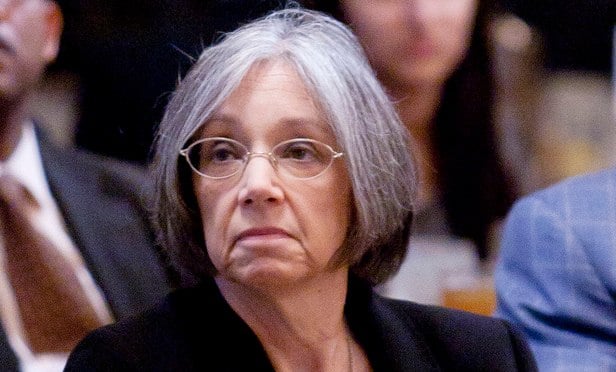Dozens of Class Actions Build on Supreme Court's 'Janus' Union Ruling
Three new petitions at the U.S. Supreme Court are tied to the justices' ruling last term against mandatory public-sector union fees.
March 14, 2019 at 02:38 PM
6 minute read
 Demonstrators outside the U.S. Supreme Court during arguments in the union fees case Janus v. AFSCME on Feb. 26, 2018. Photo: Diego M. Radzinschi/ALM
Demonstrators outside the U.S. Supreme Court during arguments in the union fees case Janus v. AFSCME on Feb. 26, 2018. Photo: Diego M. Radzinschi/ALM
Anti-union organizations, building on last year's successful challenge to public-sector union fees, have returned to the U.S. Supreme Court with three new challenges to the operations of organized labor.
The new petitions are part of what lower courts have begun to call “clean-up proceedings” in the wake of the Supreme Court's 5-4 decision last term in Janus v. AFSCME. In Janus, the conservative majority, led by Justice Samuel Alito Jr., overruled a four-decade-old precedent that said unions could impose “fair share” fees on nonmembers for the cost of collective bargaining.
“At the time of this writing, there are at least 35 class action lawsuits pending in 18 federal district courts that seek to require unions to return just a small portion of those billions of dollars in unlawfully seized union fees,” one of the petitioners told the justices.
Two of the petitions—filed by National Right to Work Legal Defense Foundation and the Buckeye Institute—confront laws that require a union's exclusive representation of public sector employees. In the third, also brought by the National Right to Work Legal Defense Foundation, non-union home care workers seek refunds of about $32 million for fees paid to the union.
The refund challenges alone are “hugely important,” said labor law scholar Charlotte Garden of Seattle University School of Law. “If unions have to refund dues for three years back or whatever the applicable statute of limitations may be, that is a potential existential threat,” she said. “Those cases have been losing at the district and appellate court levels. They seem difficult to win and should be.”
All three high court petitions rely on Janus as well as two prior rulings in which the court, again led by Alito, laid the groundwork for their First Amendment challenges. The key players this time also are familiar.
William Messenger of the National Right to Work Legal Defense Foundation, who argued the Janus case at the Supreme Court last year, is counsel of record in one of the two exclusive representation challenges—Bierman v. Walz—and in the fee refund challenge, Riffey v. Pritzker.
Baker & Hostetler partner Andrew Grossman is counsel of record in the other exclusive representation challenge—Uradnik v. Inter Faculty Organization—which originated with the free-market policy think tank Buckeye Institute.
The Uradnik petition has drawn amicus support from former Janus supporters such as the Cato Institute, Competitive Enterprise Institute, Pacific Legal Foundation, Goldwater Institute, Freedom Foundation and the National Right to Work Legal Defense Foundation. Also supporting the challenge is the National Association of Scholars, represented by Shearman & Sterling associate William Haun, and a number of public policy research and advocacy groups with counsel of record Thomas McCarthy of Consovoy McCarthy Park.
The unions and states in the three petitions have not yet filed their answers in the high court.
Here is a brief look at what the petitions argue:
>> Uradnik v. Inter Faculty Organization
The U.S. Court of Appeals for the Eighth Circuit and lower courts are wrong that a 1984 high court decision—Minnesota State Board for Community Colleges v. Knight—approved of a state's appointment of a labor union as exclusive representative of public sector employees, argues the petition. “The result of those decisions is to broadly sanction compelled representation of unwilling public employees and subsidy recipients like home healthcare workers, irrespective of their speech and associational interests. That result cannot be squared with this court's First Amendment jurisprudence.”
The Eighth Circuit, which earlier had ruled in Bierman that Knight applied, affirmed the district court's denial of a preliminary injunction after finding no likelihood of success on the merits.
>> Riffey v. Pritzker
The Seventh Circuit erred in affirming a district court decision that the plaintiffs failed to meet the requirements for approval of a class seeking refunds of union fees, according to the petition. “Here, Illinois deducted agency fees for SEIU from the proposed class of personal assistants' wages without their affirmative consent,” according to the petition. “Under Harris (v. Quinn) and Janus, each unauthorized fee seizure inflicted a First Amendment injury. The victim's subjective feelings about SEIU are immaterial to the First Amendment violation. The compensatory damages owed to each personal assistant in the putative class equals all fees seized from him or her, plus interest.”
 Judge Diane Wood of the Seventh Circuit. Credit: Diego M. Radzinschi / ALM
Judge Diane Wood of the Seventh Circuit. Credit: Diego M. Radzinschi / ALMThe Seventh Circuit panel, in an opinion by Judge Diane Wood, wrote: “The assistants spurned the opportunity to suggest a narrower class in favor of a 'go-for-broke' strategy. In doing so, however, they overlooked the substantial deference we give to the district court's decisions about predominance and manageability. The judge here came to a defensible—indeed, sensible—decision on these points.”
>> Bierman v. Walz
“Regimes of exclusive representation, like other mandatory expressive associations, are subject to a limiting constitutional principle: exacting First Amendment scrutiny,” Messenger wrote in the petition. “Whatever its merits in a public employment relationship, no compelling state interest justifies extending exclusive representation beyond that context to a citizen's relationship with government regulators.”
The Eight Circuit panel, led by Judge Steven Colloton, said in its ruling in August: “There is no meaningful distinction between this case and Knight. The current version of [state law] similarly allows the homecare providers to form their own advocacy groups independent of the exclusive representative, and it does not require any provider to join the union. According to Knight, therefore, the state has 'in no way' impinged on the providers' right not to associate by recognizing an exclusive negotiating representative.”
Read more:
US Supreme Court Ruling Fuels Suits Challenging Mandatory Bar Fees
SCOTUS Rejects Push to Expand 'Janus' Broadly to Workplace Disputes
Justices, Overturning Precedent, Restrict Labor Union Power to Collect Fees
This content has been archived. It is available through our partners, LexisNexis® and Bloomberg Law.
To view this content, please continue to their sites.
Not a Lexis Subscriber?
Subscribe Now
Not a Bloomberg Law Subscriber?
Subscribe Now
NOT FOR REPRINT
© 2025 ALM Global, LLC, All Rights Reserved. Request academic re-use from www.copyright.com. All other uses, submit a request to [email protected]. For more information visit Asset & Logo Licensing.
You Might Like
View All


Big Tech Is Cozying Up to President Trump. Here's Why Their Lawyers Are Cautiously Optimistic

Supreme Court Agrees to Hear Lawsuit Over FBI Raid at Wrong House
Trending Stories
Who Got The Work
J. Brugh Lower of Gibbons has entered an appearance for industrial equipment supplier Devco Corporation in a pending trademark infringement lawsuit. The suit, accusing the defendant of selling knock-off Graco products, was filed Dec. 18 in New Jersey District Court by Rivkin Radler on behalf of Graco Inc. and Graco Minnesota. The case, assigned to U.S. District Judge Zahid N. Quraishi, is 3:24-cv-11294, Graco Inc. et al v. Devco Corporation.
Who Got The Work
Rebecca Maller-Stein and Kent A. Yalowitz of Arnold & Porter Kaye Scholer have entered their appearances for Hanaco Venture Capital and its executives, Lior Prosor and David Frankel, in a pending securities lawsuit. The action, filed on Dec. 24 in New York Southern District Court by Zell, Aron & Co. on behalf of Goldeneye Advisors, accuses the defendants of negligently and fraudulently managing the plaintiff's $1 million investment. The case, assigned to U.S. District Judge Vernon S. Broderick, is 1:24-cv-09918, Goldeneye Advisors, LLC v. Hanaco Venture Capital, Ltd. et al.
Who Got The Work
Attorneys from A&O Shearman has stepped in as defense counsel for Toronto-Dominion Bank and other defendants in a pending securities class action. The suit, filed Dec. 11 in New York Southern District Court by Bleichmar Fonti & Auld, accuses the defendants of concealing the bank's 'pervasive' deficiencies in regards to its compliance with the Bank Secrecy Act and the quality of its anti-money laundering controls. The case, assigned to U.S. District Judge Arun Subramanian, is 1:24-cv-09445, Gonzalez v. The Toronto-Dominion Bank et al.
Who Got The Work
Crown Castle International, a Pennsylvania company providing shared communications infrastructure, has turned to Luke D. Wolf of Gordon Rees Scully Mansukhani to fend off a pending breach-of-contract lawsuit. The court action, filed Nov. 25 in Michigan Eastern District Court by Hooper Hathaway PC on behalf of The Town Residences LLC, accuses Crown Castle of failing to transfer approximately $30,000 in utility payments from T-Mobile in breach of a roof-top lease and assignment agreement. The case, assigned to U.S. District Judge Susan K. Declercq, is 2:24-cv-13131, The Town Residences LLC v. T-Mobile US, Inc. et al.
Who Got The Work
Wilfred P. Coronato and Daniel M. Schwartz of McCarter & English have stepped in as defense counsel to Electrolux Home Products Inc. in a pending product liability lawsuit. The court action, filed Nov. 26 in New York Eastern District Court by Poulos Lopiccolo PC and Nagel Rice LLP on behalf of David Stern, alleges that the defendant's refrigerators’ drawers and shelving repeatedly break and fall apart within months after purchase. The case, assigned to U.S. District Judge Joan M. Azrack, is 2:24-cv-08204, Stern v. Electrolux Home Products, Inc.
Featured Firms
Law Offices of Gary Martin Hays & Associates, P.C.
(470) 294-1674
Law Offices of Mark E. Salomone
(857) 444-6468
Smith & Hassler
(713) 739-1250








